19th century sources
website of Jelle Verheij, historian
home | publications | my photos | historical pictures | travel snap shots | monuments | 19th century sources | research tools | links | contact
Muş district (Erzurum Province) in 1844: "Memorandum regarding the state of of Moosh" by British Consul in Erzurum James Brant
original text and transscription
This report describes the political, social and economic situation in the district of Muş in 1844, the chaotic period after the first centralization attempts by the Ottoman government. According to Brant both Muslims and Armenians are completely “enthralled” (“enslaved”) by their respective rulers: the former by the ruler of Muş, İbrahim Efendi, the latter by their ecclesiastical leaders.
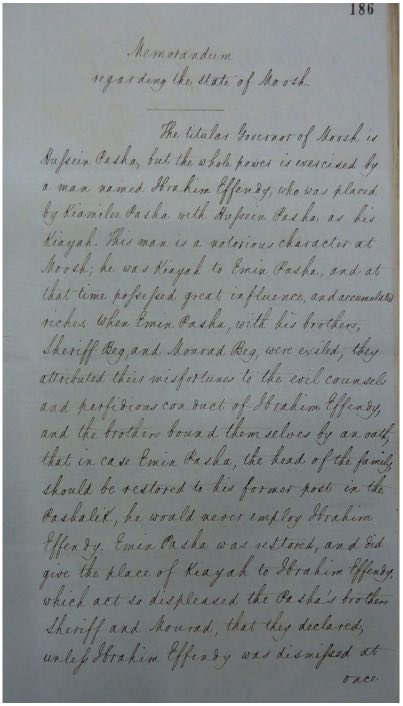
Memorandum regarding the state of Moosh
The titular Governor of Moosh is Hussein Pasha buth the whole power is exercised by a man names İbrahim Effendi, who was placed by Kiamil Pasha with Hussein Pasha, as his Kiayah. This man is a notorious character at Moosh; he was Kiayah to Emin Pasha, and at that time possessed great influence, and accumulated riches, when Emin Pasha, with his brother, Sheriff Beg, and Mourad Beg, were exiled, they attributed their misfortunes to the evil counsels and perfidious conduct of İbrahim Effendy, and the brothers bound themselves by an oath, that in case Emin Pasha, the head of the family, should be restored to his former post in the Pashalik, he would never employ İbrahim Effendy. Emin Pasha was restored, and did gave the place of Kiayah to Ibrahim Effendy, which act so displeased the Pasha’s brothers Sheriff and Mourad, that they declared, unless Ibrahim Effendy was dismissed at
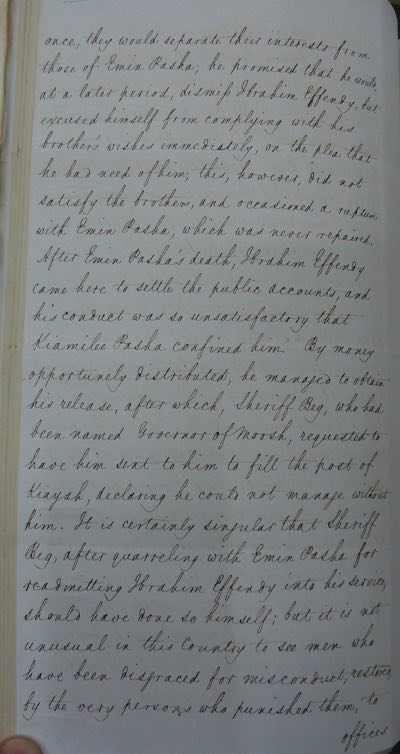
once they would separate their interests from those of Emin Pasha; he promised that he would, at a later period, dismiss Ibrahim Effendy, but excused himself from complying with his brothers’ wishes immediately, on the plea that he has need of him, this, however did not satisfy the brothers, and occassioned a rupture with Emin Pasha, which was never repaired.
After Emin Pasha’s death, Ibrahim Effendy came here to settle the public accounts, and his conduct was so unsatisfactory that Kiamil Pasha confined him. By money opportunely distributed, he managed to obtain his release, after which, Sheriff Beg, who had been named Governor of Mush, requested to have him sent to him to fill the post of Kiayah, declaring he could not manage without him. It is certainly singular that Sheriff Bey, after quarelling with Emin Pasha for readmitting Ibrahim Effendy into his service, should have done do himself [?]; but it is not unusual in this country to see men who have been disgraces for misconduct, restored by the very persons who punished them, to
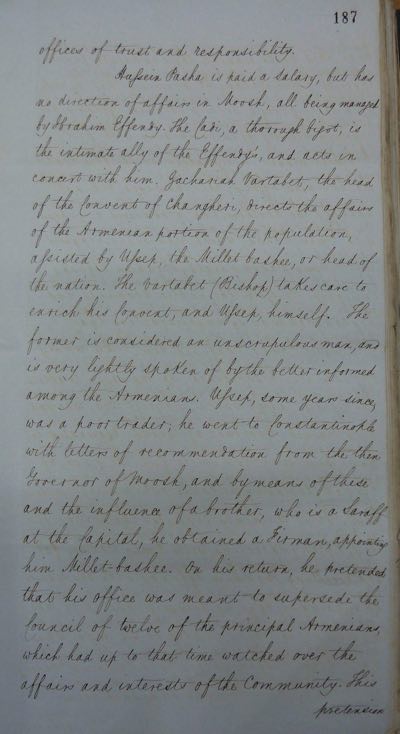
offices of trust and responsibility.
Hussein Pasha is paid a salary, but has no direction of affairs in Moosh, all being managed by Ibrahim Effendy. The Cadi, a thorough bigot, is the intimate ally of the Effendy’s, and acts in concert with him. Sachariah Vartabet, the head of the Convent of Changeri, directs the affairs of the Armenian portion of the population, assisted by Ussep (?), the Millet bashee, or head of the nation. The Vartabet (Bishop) takes care to enrich his convent, and Ussep, himself. The former is consiered an unscrupulous man, and is very lightly spoken of by the better informed among the Armenians. Ussep, some years since, was a poor trader, he went to Constantinople with letters of recommendation from the then Governor of Moosh, and by means of these and the influence of a brother, who is a Saraff at the capital, he obtained a Firman, appointing him Millet-bashee. On his return, he pretended that his office was meant to supersede the council of twelve of the principal Armenians, which had up to that time watched over the over the affairs and interests of the Community. This
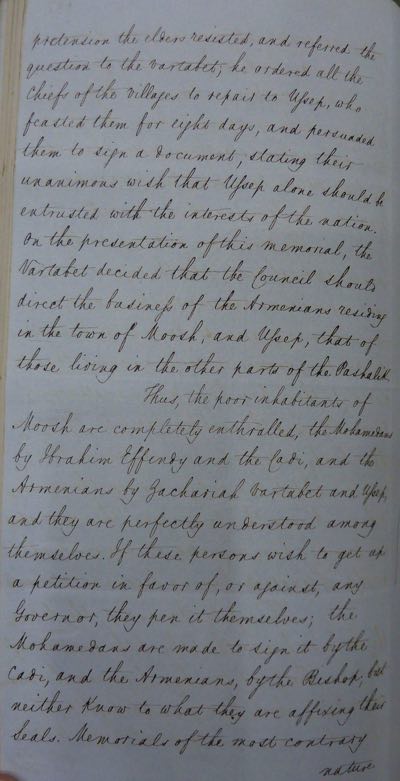
pretention the elders resisted and referred the question to the vartabet, he ordered all the chiefs of the villages to repair to Ussep, who feasted them for eight days, and persuaded them to sign a document, stating their unanimous wish that Ussep alone should be intrusted with the interests of the nation. On the presentation of this memorial the Vartabet decided that the Council should direct the business of the Armenians residing in the town of Moosh, and Ussep, that of those living in the other parts of the Pashalik.
Thus, the poor inhabitants of Mossh are completely enthralled, the Mohammedans by Ibrahim Effendy and the Cadi, and the Armenians by Sachariah Vartabet and Ussep, and they are perfectly understood among themselves. If these persons wish to get an petition in favor of, or against, any Governor, they pen it themselves, the Mohammedans are made to sign it by the Cadi, and the Armenians by the Bishop, but neither know to what they are affixing their seals. Memorials of the most contrary
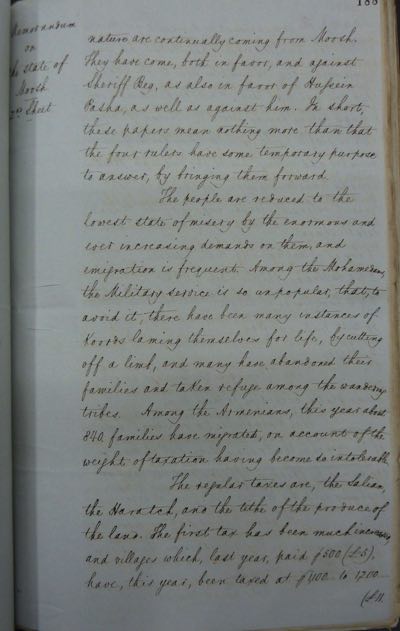
nature are continually contuining from Moosh. They had come, both in favor, and against Sheriff Beg, as also in favor of Hussein Pasha, as well as against him. In short, these papers mean nothing more than that the four rulers have some temporary purpose to answer, by bringing them forward.
The people are reduced to the lowest state of misery by the enormous and ever increasing demands on them, and emigration is frequent among the Mohammedans. The Military Servide is so unpopular. that, to avoid it, there have been instances of Koords laming themselves for life, by cutting off a limb, and many have abandoned their families and taken refuge among the wandering tribes. Among the Armenians, this year about 840 families have migrated, on account of the weight of taxation having become intolerable.
The regular taxes are, the Salian, the Haratch, and the tithe of the produce of the land. The first tax has been much increased, and villages which, last year, paid .. 500 (L 5) have this year been taxed at .. 1,100 to 1,200
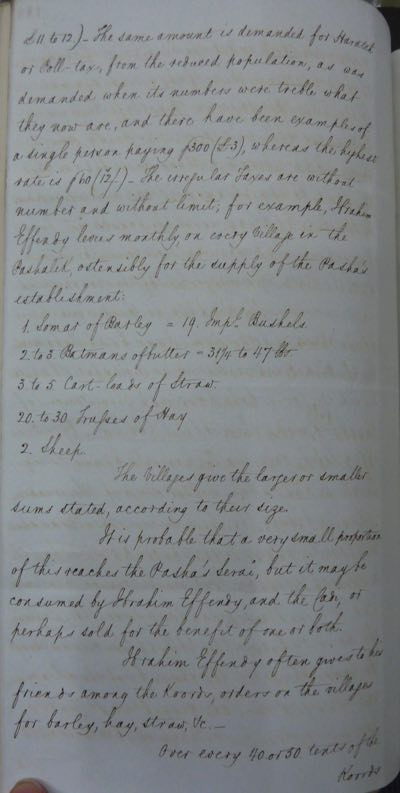
L. 11 to 12). The same amount is demanded for Haratch or poll-tax, from the reduced population as was demanded when its numbers were treble what they now are, and there have been examples of a single person pauing .. 300 (L 3), whereas the highest rate is .. 60 (12 f). The irregular taxes are without number and without limit, for example, Ibrahim Effendy levies monthly on every village in the Pashalik, ostensibly for the supply of the Pashas establishment:
1. Somas of Barley = 19... Bushels
2. to 3 batmans of futter, 31 1/4 to 47 lbs
3 to 5 cart loads of straw
20 to 30 trusses of hay
2 sheep.
The villagers give the larger or smaller sums stated according to their size.
It is probably that a very small proportion of this reaches the Pasha’s Serai, but it may be consiumed by Ibrahim Effendy, and the Cadi, or perhaps sold for the benefit of one or both.
Ibrahim Effendy often gives to his friends among the Koords, orders on the villages for barley, hay, straw,&c.
Over every 40 or 50 tents of the
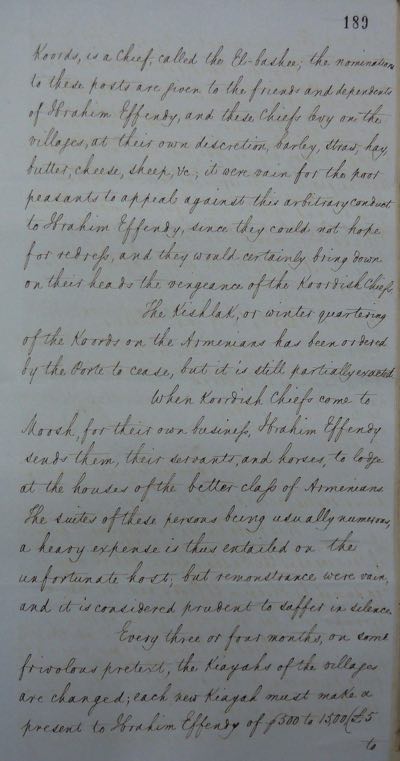
Koords is a chef, called the El-Bashee, the nominations of these posts are given to the friends and dependents of Ibrahim Effendy, and these Chiefs levy on the villages, at their own discretion, barley, straw, hay, butter, cheese, sheep, &c; it were vain for the poor peasants to appeal against this arbitrary conduct to Ibrahim Effendy, since they could not hope for redress, and they would certainly bring down on their heads the vengenace of the Koordish chiefs.
The Kishlak, or winter quartering of the Koords on the Armenians has been ordered by the Porte to cease, but it is still partially exacted.
When Koordish chiefs come to Moosh, for their own business, Ibrahim Effendy sends them, their servants, and horses, to lodge at the houses of the better class of Armenians. The suites of these persons being actually numerous, a heavy expense is thus entailed on the unfortunate host; but remonstrance were vain, and it is considered prudent to suffer in silence.
Every three or four months, on some frivolous pretext, the Kiayahs of the villages are changed; each new Kiayah must make a present to Ibrahim Effendy of . 500 to 1500 (L 5
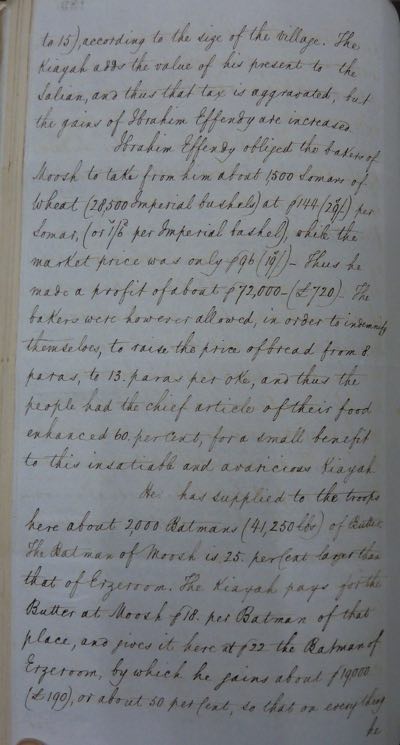
to 15], according to the size of the village. The Kiayah adds the value of his present to the Salian, and thus that tax is aggravated, but the gains of Ibrahim Effendy are increased.
Ibrahim Effendy obliged the bakers of Moosh to take from him about 1,500 Lomans of wheat (28,500 Imperial bushels) at p.144 (29.. ) per Loman (or 1/6 per Imperial bushel), while the market price was only p.96 (19..). Thus he makes a profit of about p.72,000 (L. 720). The bakers were however allowed, in order to indemnify themselves, to raise the price of bread from 8 paras to 13 paras per oke, and thus the people had the chief article of their food enhanced 60 percent, for a small benefit to this insatiable and avaricious Kiayah.
He has supplied to the troops here about 2,000 Batmans (41,250 lbs) of butter. The Batman of Moosh is 25 percent larger than that of Erzeroum. The Kiayah paus for the Butter at Moosh p.18 per Batman of that place, and gives it here at p.22 the Batman of Erzeroom, by which he gains about p.19,000 (L. 190) or about 50 percent, so that on everything
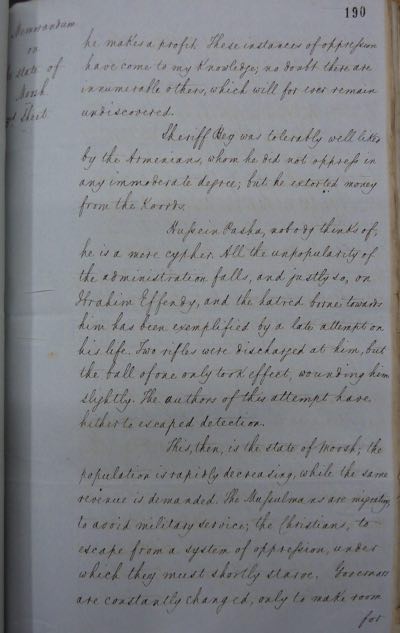
he makes a profit. These instances of oppression have come to my knowledge, no doubt there are innumerable others, which will for ever remain uncovered.
Sheriff Bey was tolerably well liked by the Armenians, who he did not opppress in any immoderate degree; but he extorted money from the Koords.
Hussein Pasha, nobody thinks of, he is a mere cypher. All the unpopularity of the administration falls, and justly so, on Ibrahim Effendy, and the hatred borne towards him has been exemplified by a late attempt on his life. Two rifles were discharged at him, but the ball of one only took effect, wounding him slightly. The authors of this attempt have hitherto escaped detection.
This, then, is the state of Moosh; the population is rapidly decreasing, while the same revenue is demanded. The Mussulmans are migrating to avoid military service; the Christians, to escape from a system of oppression, under which they must shortly starve. Governors are constantly changed, only to make room
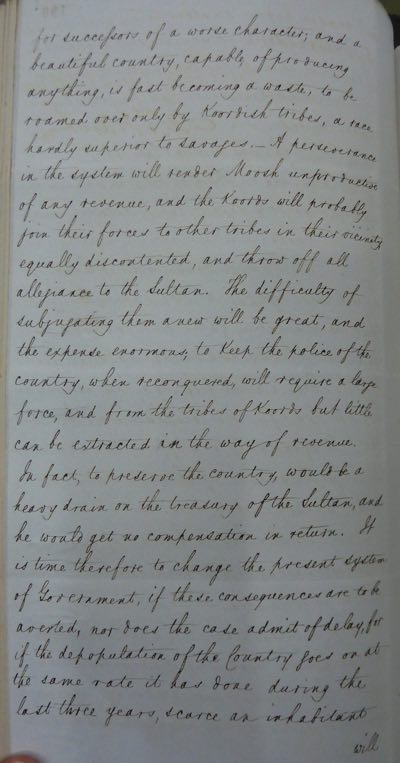
for successors of a worse character; and a beautiful country, capable of producing anything, is fast becoming a waste, to be roamed over only by Koordish tribes, a race hardly superior to savages. A perseverance in the system will render Moosh unproductive of any revenue, and the Koords will probably join their forces to other tribes in their vicinity equally discontended, and throw off all allegiance to the Sultan. The difficulty of subjugating them anew will be great, and the expense enormous; to keep the police of the country, when reconguered, will require a large force, and from the tribes of Koords, but little can be extracted in the way of revenue. In fact, to preserve the country, would be a heavy drain on the treasury of the Sultan, and he would get no compensation in return. It is time therefore to change the present system of government, if these consequences are to be averted, nor does the case admit of delay, for if the depopulation of the country goes on at the same rate it has done during the last three years, scarce an inhabitant
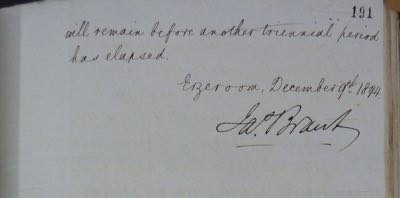
will remain before another triannual period has elapsed.
Erzeroom, December 9th, 1844
Ja. Brant